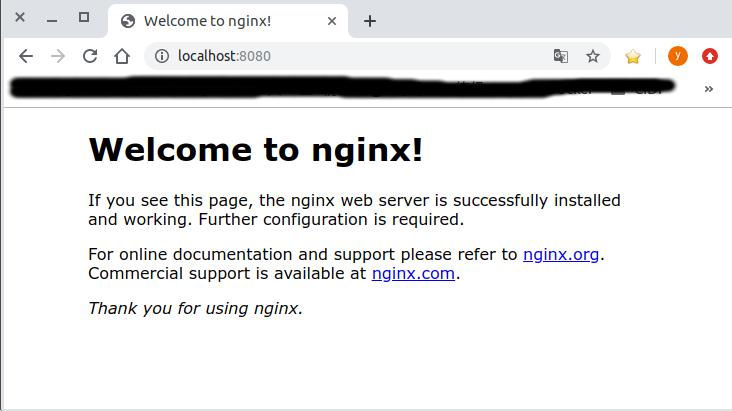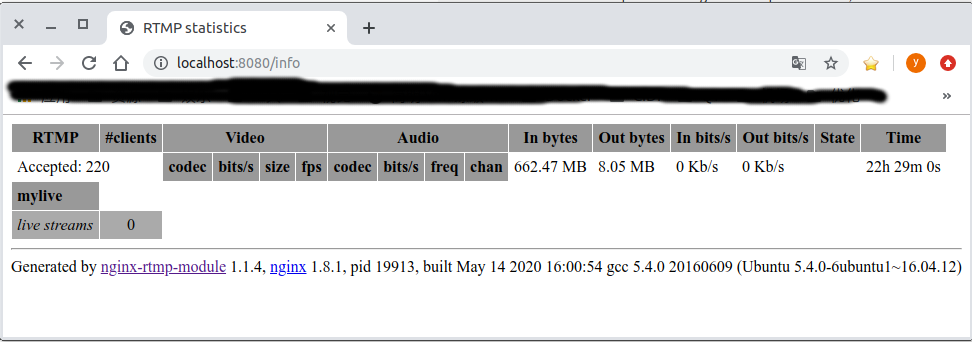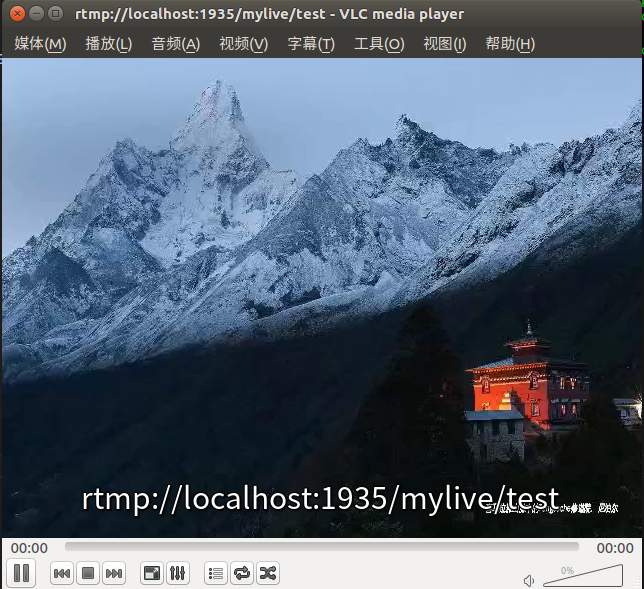This scheme realizes RTMP streaming after single frame image processing
Reference resources Nginx and nginx RTMP module building RTMP video live and on demand servers,<jkuri
/opencv-ffmpeg-rtmp-stream>
,Compiling and installing ffmpeg under Linux (modification - simple and complex final version)
Setting up nginx server
download nginx1.8.1,nginx-rtmp-module
Install nginx dependency Library
sudo apt-get install libpcre3 libpcre3-dev sudo apt-get install openssl libssl-dev
Compile and install nginx with nginx RTMP module
cd nginx-1.8.1 ./configure --prefix=/usr/local/nginx --add-module=../nginx-rtmp-module make sudo make install
Run at this time
/usr/local/nginx/sbin/nginx
You can run nginx server
Open the browser, fill in localhost in the address bar, and there is
Configure live service
Enter directory / usr/local/nginx/conf
Modify file nginx.conf by
#user nobody; worker_processes 1; events { worker_connections 1024; } rtmp { server { listen 1935; chunk_size 4096; application mylive{ live on; #live on means live mode is enabled record off; } } } http { include mime.types; default_type application/octet-stream; sendfile on; keepalive_timeout 65; server { listen 8080; server_name localhost; location / { root html; index index.html index.htm; } location /pop/video { alias /var/video; } location /info { rtmp_stat all; rtmp_stat_stylesheet stat.xsl; } location /stat.xsl { root path-to/nginx-rtmp-module/; } error_page 500 502 503 504 /50x.html; location = /50x.html { root html; } } }
Note = = "location"/ stat.xsl ”==You need to fill in the absolute address of nginx RTMP module
Restart nginx server
sudo ./sbin/nginx -s reload
Open the browser and fill in the address bar localhost:8080/info , yes
Note "mylive" in the figure, indicating that the configuration has taken effect
Compile and install ffmpeg
Installation dependency
sudo apt-get install autoconf automake build-essential libass-dev libfreetype6-dev libtheora-dev libtool libvorbis-dev pkg-config texinfo zlib1g-dev unzip cmake yasm libx264-dev libmp3lame-dev libopus-dev libsdl1.2-dev libva-dev libvdpau-dev libxcb1-dev libxcb-shm0-dev libxcb-xfixes0-dev libfaac* libopenjpeg * libv4l-dev libvpx-dev libssl-dev
download ffmpeg4.0.2 (it is also OK to test ffmpeg3)
Build install
./configure --prefix=/usr/local/ffmpeg/ --enable-shared --enable-gpl --enable-libx264 make sudo make install
Push flow
reference resources <jkuri
/opencv-ffmpeg-rtmp-stream>
RTMP of- stream.cpp
be careful
1) bitrate=300000 means the speed of video transmission is 300kb/s, and if the speed is low, the phenomenon of video mosaic will be very serious
2) On line 156
std::vector<uint8_t> imgbuf(height * width * 3 + 16);
It's a very mysterious line. It doesn't make any sense, but if the program is commented out, it will probably crash in the following sentence
sws_scale(swsctx, &image.data, stride, 0, image.rows, frame->data, frame->linesize);
Of course, even if it is added, it may collapse, but the probability is lower
It is estimated that it is the BUG of the library. Try the latest ffmpeg 4.2.3. The problem has not been solved
